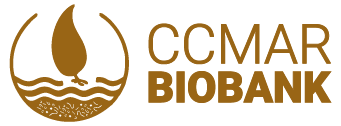Research
The CCMAR biobank actively works to deliver knowledge underpinning macroalgae ecology, physiology, and genetics, therefore helping in the management of wild macroalgal populations, successful habitat restoration, biotechnological applications, and sustainable seaweed aquaculture.
Marine Forest Restoration Methodologies
We aim to contribute with knowledge and methodology for optimal macroalgae restoration. Different restoration techniques (e.g., transplantation with scuba diving, microbiome-engineering) are being tested to improve the establishment of macroalgae and therefore combat habitat loss. Seeding techniques (e.g., substrates, macroalgae densities) and cultivation conditions in the laboratory are also under study.


Future-Proof Strains
The Biobank is also dedicated to providing a reliable and competitive source of future-proof strains through the development of those with improved growth and resilience to environmental changes (e.g., strain selection, selective breeding, stress priming, microbial pre- and probiotics, microbiome engineering). Macroalgae strains that can address climate change will be important resources for successful restoration actions in locations where seaweed forests were lost due to heat waves and for the emerging European aquaculture sector in an ever-changing marine environment.
Strain selection:



Priming experiment:


Integrated Multitrophic Aquaculture (IMTA)
In collaboration with a finfish farm, the biobank evaluates the beneficial effects of macroalgae IMTA. The benefits for seaweed growth, nutrient bioremediation by the seaweeds of farm effluent, and the extent to which seaweed co-cultivation can influence the microbiome of fish farm water and fish are under evaluation.

Optimise Cultivation Methodologies
The biobank is evaluating the effect of different biostimulants and plant hormones on the growth, microbiome, reproduction and thermal tolerance of several macroalgae strains. The macroalgae-based biostimulants are emerging as a sustainable biological method to improve agronomic production, growth, and health. However, the use of these natural products in seaweed cultivation is not yet explored.

Macroalgal
Microbiomes
All organisms contain a complex community of associated microorganisms, their microbiome. These microbiomes perform essential services for their host, influencing host growth and development. We characterize (by state-of-the-art metagenomics) and isolate and characterize microbiome members with the final goal of improving algal cultivation (growth rates, resilience etc.), conservation, and restoration, via microbiome engineering.
